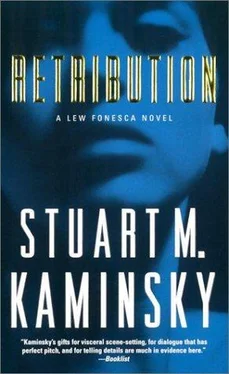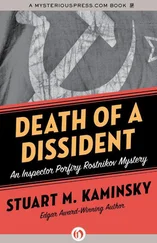Stuart Kaminsky - Retribution
Здесь есть возможность читать онлайн «Stuart Kaminsky - Retribution» весь текст электронной книги совершенно бесплатно (целиком полную версию без сокращений). В некоторых случаях можно слушать аудио, скачать через торрент в формате fb2 и присутствует краткое содержание. Жанр: Криминальный детектив, на английском языке. Описание произведения, (предисловие) а так же отзывы посетителей доступны на портале библиотеки ЛибКат.
- Название:Retribution
- Автор:
- Жанр:
- Год:неизвестен
- ISBN:нет данных
- Рейтинг книги:4 / 5. Голосов: 1
-
Избранное:Добавить в избранное
- Отзывы:
-
Ваша оценка:
- 80
- 1
- 2
- 3
- 4
- 5
Retribution: краткое содержание, описание и аннотация
Предлагаем к чтению аннотацию, описание, краткое содержание или предисловие (зависит от того, что написал сам автор книги «Retribution»). Если вы не нашли необходимую информацию о книге — напишите в комментариях, мы постараемся отыскать её.
Retribution — читать онлайн бесплатно полную книгу (весь текст) целиком
Ниже представлен текст книги, разбитый по страницам. Система сохранения места последней прочитанной страницы, позволяет с удобством читать онлайн бесплатно книгу «Retribution», без необходимости каждый раз заново искать на чём Вы остановились. Поставьте закладку, и сможете в любой момент перейти на страницу, на которой закончили чтение.
Интервал:
Закладка:
The woman placed a white bag on the counter and went back to her work.
“Knives, forks, napkins are in the sack,” Raymond said. “Fourteen dollars even.”
I paid the bill while Ames picked up the bag.
“We’re not here to hurt Mr. Cleveland or his wife,” I said. “Her brother just lost contact with her.”
Two teenage boys and a girl- came in. One of the boys was saying, “Singin’? You call that shit singin’? I call that shit ‘shit.’”
“You might try Collier Street,” Raymond said softly. “You might ask around. I wouldn’t do it at night though. Wait till morning.”
“Thanks,” I said.
Ames and I left. The teenagers didn’t look at us. We went back to a Motel 8 we had passed coming into Vanaloosa. The room had two beds, a television, and a small table.
We watched the tail end of a Will Rogers film on AMC while we ate.
“Good ribs,” Ames said.
“Very good,” I agreed.
Besides “good night,” that was all of the conversation we had before we turned off the lights a little before midnight.
When I woke up in the morning, Ames was sitting in a chair reading.
“I need a shave and shower,” I said.
Ames nodded. I looked at the cover of the book he was reading.
It was Conrad Lonsberg’s Fool’s Love.
When I came out of the bathroom clean, shaven, and dressed, Ames, now wearing a loose-fitting gray jacket, stood up, handed me the book, and pointed to a paragraph on page 148.
“Went back to it,” Ames said.
I sat on the bed and read the paragraph.
There was no Amy now. There was no Sherry. She sat in the diner with an enormous double order of corn flakes topped with strawberries, drowning in half and half. She thought about who she should be now. She thought about the baby inside her who was just beginning to kick. She needed a name for him or her. She needed a name for herself. Not something exotic. She knew now that exotic just wasn’t in her and stylish wasn’t in her and New York wasn’t in her. And going back to her mother was defeat. She wasn’t a quitter. She would never quit. She had six hundred dollars in her purse and two lives inside her. She paused with a big spoonful of corn flakes in her hand and decided. Her name was from that moment Diane Lowell. If the child was a girl, her name would be Laura. If it was a boy, his name would be Bradley.
I handed the book back to Ames who picked up his duffel bag and followed me out the door. It was just after eight in the morning. We had toast, coffee, and fruit at the motel’s morning continental breakfast that was served in the lobby. And then we were on our way.
Collier Street wasn’t hard to find. It was one of those run-down side streets on which some developer had thrown up one-story white-frame houses back in the mid-1940s for the wave of servicemen coming back from the war and getting married and raising families in whatever jobs were available in Vanaloosa or for commuting to Macon.
Fifty years later, the houses were long past the wrecker. They were occupied by black families where the breadwinners were women who cleaned house for the Macon middle class and businesses. How did I know? Because it looked exactly like neighborhoods I had seen from California to Florida.
The houses were sagging and dead or dying. A few of them had been shorn up and coaxed like punch-drunk boxers into standing up for one more round.
Three little girls were jumping rope when we parked. They were the only people in sight. We could hear them chanting something to the beat of the rope against the cracked sidewalk. The girl doing the jumping was about eleven. She jumped tirelessly and smiled at us as we watched and waited and the girls kept chanting something about babies.
Finally the girl jumped out of the twirling rope and looked at us.
“We’re looking for this man,” I said, showing the girl Dorsey’s photograph. “Know him?”
The other two girls moved in to take a look. None of them recognized him.
“He lives on this street,” I said.
“Only white people on this street live over there,” the jumping girl said, pointing to a house across the street. “Old white people.”
“You know their name?” I asked.
“Them’s the Clevelands,” answered another girl. “They never go out. But them’s the Clevelands.”
“He goes out sometimes,” one of the other girls said.
“Sometimes at night,” the jumping girl agreed. “Not much.”
I thanked them and Ames nodded.
Behind us, one of the little girls whispered, “They gonna see the witch.”
We crossed the street. The girls went back to their chanting and jumping.
The morning already promised a hot day.
The Cleveland house looked as if it couldn’t take another punch. The porch sagged and the paint flecked. The screen door had been patched so many times that it looked like modern art, and the dirt lawn, with only a barren little tree, had long given up.
I knocked at the peeling frame of the screen door. Nothing. I knocked again and heard a shuffle inside. It stopped. I knocked again and the shuffle moved toward the door and then the door opened, but just a crack.
“What?” came a man’s voice.
“Mr. Cleveland?” I asked.
“So?” he asked in return.
“My name is Fonesca. This is my partner Mr. McKinney. We’d like to talk to you for a minute or two.”
He hesitated and started to close the door.
“It’s about your wife,” I said.
The door stopped closing.
“My wife isn’t well,” he said.
“I’ve got a message for her,” I said.
“No,” the man said, closing the door.
“Mr. Dorsey,” I said, hoping to penetrate with the bullet of his real name, “I think you’re going to have to deal with us, either now or tomorrow or the next day. We can keep coming back and draw attention to you or you can let us in and get it over with.”
If he hadn’t opened the door, we would have left and I would have gone back to Sarasota and told Marvin where she was. But Dorsey didn’t call my bluff. The door opened and we went through the screen door into a darkened hall. I could see the thin outline of a man in front of me. He backed away and we followed. When we stepped into a small living room, there was enough light coming through the drawn shades to see that the man was dressed in a badly faded blue shirt and equally faded blue pants. His mouth was partly open and his teeth were bad but they were all there. In his right hand he held a Smith amp; Wesson. 38 with a six-inch barrel, a favorite with cops. Charles Dorsey used to be a cop.
The most striking thing about Charles Dorsey was that I knew he couldn’t be more than fifty, but he looked at least twenty years older, older than Ames. His hair was white, his shoulders bent, and his eyes a vacant, faded blue.
“Who are you?”
“My name is Fonesca, just the way I told you.”
There were chairs to sit in, even a sofa, but they were old with a washed-out, ghostly pattern and I was sure that dust would rise from them if we sat. Dorsey didn’t ask us to sit.
“He sent you, didn’t he?” Dorsey said, pistol moving between me and Ames.
“He?”
“Her brother,” he said.
“I just want to talk to your wife for a minute,” I said.
“No,” he said.
Something stirred in the doorway and I turned, to the sound of sagging wooden floors. My eyes met the deepest, darkest, and most melancholy eyes I had ever seen. The eyes were set in a soft balloon of a face resting on a huge, neckless, round body. Vera Lynn Uliaks Dorsey walked with a cane to support her mass. Her breathing was pained and labored.
“They’re from Marvin,” Dorsey said.
Her eyes opened wide in fear.
“He wants to talk to you,” I explained.
Читать дальшеИнтервал:
Закладка:
Похожие книги на «Retribution»
Представляем Вашему вниманию похожие книги на «Retribution» списком для выбора. Мы отобрали схожую по названию и смыслу литературу в надежде предоставить читателям больше вариантов отыскать новые, интересные, ещё непрочитанные произведения.
Обсуждение, отзывы о книге «Retribution» и просто собственные мнения читателей. Оставьте ваши комментарии, напишите, что Вы думаете о произведении, его смысле или главных героях. Укажите что конкретно понравилось, а что нет, и почему Вы так считаете.












